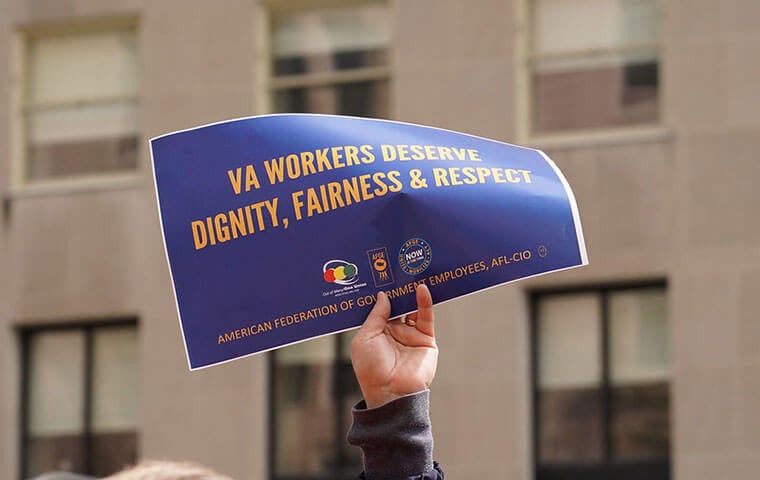 AFGE workers hold a rally outside Veterans Affairs headquarters in Washington, DC, on March 30, 2022. Disagreements have arisen over reentry plans, to the point of unions filing formal complaints. Image: AFGE photo by Jay Mallin
By: FEDweek Staff
AFGE workers hold a rally outside Veterans Affairs headquarters in Washington, DC, on March 30, 2022. Disagreements have arisen over reentry plans, to the point of unions filing formal complaints. Image: AFGE photo by Jay Mallin
By: FEDweek StaffThe newest Biden administration guidance on Coronavirus-related workplace safety practices tells agencies to bargain over certain details with unions, at a time when relations between the two sides have grown testy over whether agencies are doing so regarding another pandemic-related issue, that being offsite work.
Says the guidance, “Agencies should engage with employee unions at their earliest opportunity as they adjust agency COVID-19 workplace safety plans, protocols, and policies, and otherwise satisfy any applicable collective bargaining obligations under the law, if any, at the earliest opportunity, including on a post-implementation basis where appropriate.”
“Agencies should also review existing collective bargaining agreements (CBAs) to assess whether these updated COVID-19 workplace safety protocols conflict with existing CBA provisions. To the extent existing CBA provisions exist, agencies are strongly encouraged to bring the CBA into compliance with these updated COVID-19 workplace safety protocols at the earliest opportunity permitted under the law,” it says.
The administration has used similar language in prior guidance on overall workplace issues, including returning to regular workplaces employees who had been working offsite either full-time or for a substantial part of their schedules. While relations between labor and management have overall been much friendlier under the Biden White House than under the Trump administration, disagreements have arisen over those “reentry” plans—to the point of unions filing formal complaints.
For example, the FLRA recently agreed to hold a hearing on an unfair labor practice complaint filed by an AFGE council charging that the EEOC carried out its reentry policy without “providing the union with an opportunity to negotiate over the procedures and appropriate arrangements of the change.” In unusually harsh words for the current administration, the AFGE said that “As the agency charged with protecting the rights of all workers across the country, the EEOC should not ignore the collective bargaining rights of its own employees.”
An AFGE council at HUD has filed a complaint regarding eligibility for offsite work by employees it represents there, as did the NTEU union against the Treasury Department’s Bureau of Fiscal Service. The FLRA meanwhile recently issued a decision in favor of the State Department in a complaint brought by the NFFE union over eligibility of passport services workers to work remotely.
The AFGE also has filed several complaints with the FLRA related to ongoing negotiations for a new master contract with the VA.
Vaccination Status No Longer Pertinent to Some Federal Workplace Safety Protocols
Vaccine Mandate Not ‘Currently’ in Effect, Task Force Stresses
Biden Signs Climate, Tax Bill with Polarizing IRS Workforce Boost
Decisions on Key Workplace Issues Left to September – and Likely Later
Biden Letter Likely Next Step Toward 4.6 Percent Fed Pay Raise
Bill before Senate Would Alter Retirement Savings, Distribution Policies
Lower-Performing Postal Facilities Share Common Personnel Issues, IG Says
See also,
What Are Desk Audits? Understanding Position Classification Appeals
Key Senate Bill Backs 4.6 Percent Raise, Would Ban Future Schedule F
Newly Offered Bills Show Sharply Differing Visions for Federal Workforce

